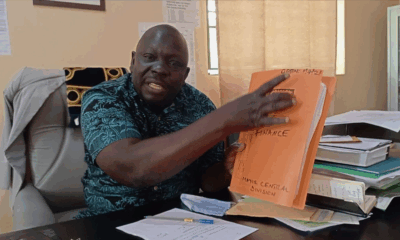Life & Style
What Is Procrastination Costing You?
Procrastination is the act of delaying or postponing tasks that need to be done, often choosing to do more enjoyable or easier activities instead. It’s not simply about poor time management—it usually happens when people feel overwhelmed, unmotivated, fearful of failure, or uncertain about where to start.
Though procrastination may seem harmless, it slowly erodes our discipline and spiritual momentum. How can we break the cycle of procrastination?
We are living in a modern procrastination epidemic. Our schedules are overflowing; our attention is fractured by endless digital and social distractions; and the truly important tasks often get buried beneath the urgent or entertaining. In such an environment, putting things off has become both common and normalised.
The challenge? What starts as simple task avoidance can gradually evolve into a lifestyle marked by delay, missed opportunities and even spiritual stagnation.
What is the real cost of procrastination—personally, professionally and spiritually?
Procrastination’s modern toll
The problem of procrastination can be costly. Consider the following:
- Financial impact. Joseph R. Ferrari’s study finds that a single point increase in procrastination on a 5-point scale is associated with a $15,000 decrease in annual salary.
- Employment struggles. The study also reports that 57 percent of unemployed individuals identify as procrastinators.
- Mental health decline. A study of Swedish university students links procrastination with increased depression, anxiety and stress.
- Sleep and physical health. The study also indicates that procrastination can lead to physical inactivity, sleep disturbances and upper body pain.
- Relational and social strain. An article in the Journal of Public Health links procrastination to greater loneliness, isolation and strained relationships due to unmet obligations and broken commitments.
Procrastination may feel like a short-term escape, but in the long run, it quietly chips away at our quality of life.
But what about the spiritual cost?
How procrastination leads to spiritual weakness
At its root, procrastination erodes impulse control, the ability to resist urges and make disciplined choices. A lack of impulse control can dull our ability to resist temptation and distractions. Weakening our response to temptation is not a risk we can afford to take.
Christians are to be spiritually alert, not ruled by impulses and distractions. Spiritually, procrastination can have the following consequences:
- Procrastination leads us to reject self-denial. Jesus said, “If anyone desires to come after Me, let him deny himself, and take up his cross daily, and follow Me” (Luke 9:23). When we procrastinate, especially to avoid discomfort, we’re actually training ourselves to run away from the very discipline Christ calls us to run toward.
We are urged to “run with endurance the race that is set before us” (Hebrews 12:1). Every time we delay our run, we’re telling our flesh that comfort is more important than obedience. Over time, that weakens spiritual character.
- Procrastination undermines faith. Faith isn’t about waiting for the “right moment”—until we feel motivated or conditions are perfect. Faith moves forward in obedience, despite uncertainty. If we constantly wait for the “right mood” or the ideal setup, we’ll miss out on the kind of growth that only happens through trusting God in the middle of the unknown.
“He who observes the wind will not sow, and he who regards the clouds will not reap” (Ecclesiastes 11:4). This verse implies that waiting for the perfect conditions leads to missed opportunities. We must start, even if conditions aren’t ideal.
- Procrastination kills spiritual momentum and clarity. Hebrews 12:1 instructs us to “lay aside every weight, and the sin which so easily ensnares us.” Weights can slow us down, exhaust us and cause us to stumble.
Consider procrastination as a weight. When we delay or avoid action, it can disrupt our spiritual momentum and cloud our understanding of God’s will. Consistently taking small steps of obedience is crucial for hearing God’s direction more clearly.
- Procrastination worsens real-world outcomes. Practically speaking, procrastinating promotes lost time, scrambling at the last minute, missing opportunities and delivering less than our best. But more importantly, we risk falling short in the responsibilities God has given us—whether in relationships, work or service—because we waited too long to act.
Mark 4:19 warns us that the “cares of this world, the deceitfulness of riches, and the desires for other things” can “choke the word” and cause it to become “unfruitful.” Being ruled by worldly distractions can derail our spiritual growth and prevent us from bearing godly fruit.
Practical solutions to strengthen impulse control
Here are some practical ways to stay spiritually alert and avoid being ruled by distractions:
- Meditate and reflect. Practice pausing to think before reacting. Take time to examine your thoughts and responses.
- Habit reversal training. Identify your triggers and consciously replace unwanted behaviors with healthier responses.
- Delay gratification. Train yourself to wait before acting on impulses. Try strategies like the “10-minute rule”—waiting at least 10 minutes before you do something. You may then find the urge has lessened and you’re able to make a better choice.
- Journal. Track your thoughts and behaviours to gain insight into yourself. Look for patterns and measure your progress over time.
- Exercise regularly. Physical activity boosts endorphins, elevates mood and sharpens brain function, all of which support better impulse control.
- Eat a balanced diet. Good nutrition supports emotional stability and cognitive health.
- Get adequate sleep. Rest is essential; lack of sleep impairs decision-making and self-control.
- Set clear goals. SMART goals (specific, measurable, achievable, relevant, time-bound) provide direction and reduce aimless distraction.
- Stick to structured routines. Consistent daily rhythms reduce uncertainty and impulsiveness.
- Build a support network. Surround yourself with people who offer accountability, encouragement and spiritual support.
Take action today
Take just one step forward.
“The soul of a lazy man desires, and has nothing; but the soul of the diligent shall be made rich” (Proverbs 13:4). Desire without action leads to nothing. Diligence is what produces fruit.
The main step in Christian decision-making is to do.
Don’t wait for the perfect moment . . . it rarely comes. God has equipped you with everything you need to begin today. If it is a problem for you, acknowledge the destructive habit of procrastination and be diligent in taking bold steps to overcome it.
Author Lauren Johnson attends the St. Petersburg, Florida, congregation of the Church of God, a Worldwide Association.
Comments



























